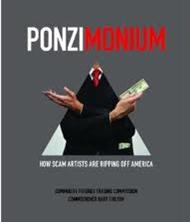|
CFTC's First Educational Outreach Effort Touches on Key Agency Mission: Investor Protections
Ponzimonium is the 65 page tome written by colorful CFTC commissioner Bart Chilton showing investors how to avoid being victim to investment fraud. Mr. Chilton's motivation for writing the book was clear. "In the wake of the Madoff scandal, I kept seeing all these Ponzi cases – mini-Madoffs, if you will – at the Commodity Futures Trading Commission (CFTC)," Chilton noted. "It got me thinking about how many folks were duped were pretty savvy folks. I took these ten cases and tried to make them not sound like it was written by a Government bureaucrat."
"Ponzimonium is the only consumer education piece we have at the agency," he said, noting with impatience the fact the CFTC just hired a just hired someone to head up a new consumer education and outreach office, something he's been calling for since 2008. On balance the book is well written, typically focusing on retail investors. However, nuggets of wisdom can be found for the professional investor. Primary educational messages in the book include advice that investors not invest in un-regulated entities or individuals who trade unregulated markets and investors conduct background checks of managers before investing.
Many of the stories carry basic messages to which astute professional investors would likely know to avoid. This includes stories of investors being guaranteed profits and ponzi scam artists exhibiting overly strong performance through all market environments. If professional investors wished to skip the dramatic stories, they could travel right to page 53 where the "Investor Bill of Rights." This section advises investors to question managed futures fund investments that include significant fund lock-up clauses, do not properly explain obligations and fund expenses, require additional investment capital at a future point in time and have not appropriately disclosed all risks. After the Bill of Rights, investors can continue right to the "Red Flags of Fraud" on page 57. While many of the red flags are basic, some of the more sophisticated flags include the fund's need for secrecy, fees and expenses are not clear, the investment has abnormal methods of accepting investments and conducting independent research on the fund is difficult. Overall the book is strong, however, one might have wanted a discussion of the differences between a fund structure and direct account investment and perhaps questioning as to why managed futures funds require total secrecy while the direct account offers total transparency. CFTC commission Chilton has a history in the commodities industry, having worked for agricultural hedging interests including representing family farmers for the National Farmers Union and the U.S. Department of Agriculture before being nominated as CFTC commissioner by President Bush the CFTC. With Mr. Chilton rumored to be in consideration to replace current CFTC Chairman Gary Gensler, the Ponzimonium book provides an interesting platform to usher in a new era of agency transparency and outreach. Observing Mr. Chilton one gets the sense he has a lot to communicate beyond that standard party line. For the book "I had to tone it down from my normal style," Mr. Chilton confided. "Folks really objected to me calling Mr. Madoff a sleaze ball (which was omitted from the book)." This will likely be the first of many efforts by Mr. Chilton to take the reins of intelligent investor protections. For additional information visit: www.CFTC.gov
|
|
This article was published in Opalesque Futures Intelligence.
|





 RSS
RSS
 With shoulder-length blond hair, Mr. Chilton doesn't need to worry about sounding like a boring government drone. Known as an avid music lover, the guitar strumming CFTC commissioner's book is essentially broken down into ten stories of Ponzi schemes, each with a slightly different educational message for investors, with back matter that includes an investor bill of rights, red flags of fraud and a resources section.
With shoulder-length blond hair, Mr. Chilton doesn't need to worry about sounding like a boring government drone. Known as an avid music lover, the guitar strumming CFTC commissioner's book is essentially broken down into ten stories of Ponzi schemes, each with a slightly different educational message for investors, with back matter that includes an investor bill of rights, red flags of fraud and a resources section. In a particularly interesting story that received national media attention, Chapter Five profiles the activities of Charles Hays, who doctored actual statements from legitimate Futures Commission Merchant Dorman Trading to perpetrate his fraud. Chapter Six tells the story of Daren Potter, who cleverly categorized investments in his program as "loans" and was ironically victim of a Ponzi scheme himself.
In a particularly interesting story that received national media attention, Chapter Five profiles the activities of Charles Hays, who doctored actual statements from legitimate Futures Commission Merchant Dorman Trading to perpetrate his fraud. Chapter Six tells the story of Daren Potter, who cleverly categorized investments in his program as "loans" and was ironically victim of a Ponzi scheme himself.










